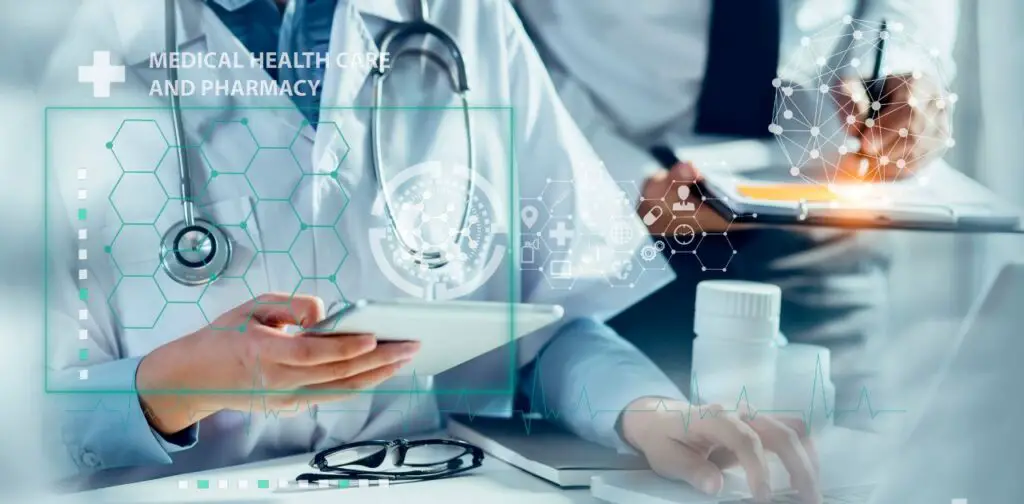What is health management and technology? How is it shaping the future of healthcare? These pressing questions are at the forefront of a rapidly evolving industry, prompting many to explore the synergy between healthcare practices and technological advancements.
Health management and technology involve integrating digital tools to enhance patient care, streamline operations, and improve healthcare outcomes. This intersection creates more efficient and personalized healthcare solutions.
As we look towards 2024, this blend of health management and tech is positioned to revolutionize the industry with new trends and solutions. From telemedicine to AI-driven diagnostics, these advancements promise to make healthcare more accessible and effective for patients and providers alike.
Table of Contents
How will technology redefine healthcare management in 2024?
In 2024, technology will transform healthcare management by enhancing accessibility, efficiency, and personalization. With advancements such as AI, telemedicine, and data analytics, patient outcomes will improve as healthcare systems adapt to digital innovations.
AI-Powered Solutions
AI will streamline healthcare operations by predicting patient needs and optimizing resource allocation. These intelligent systems can identify potential health issues early, allowing for proactive intervention and personalized treatment plans that cater to individual patients.
Telemedicine Expansion
Expanding telemedicine services will make healthcare more accessible to remote and underserved populations. Virtual consultations reduce the need for physical visits, saving time and resources for both patients and providers while offering convenience without compromising quality.
Data-Driven Insights
Utilizing data analytics will provide valuable insights into patient care and system efficiency. By analyzing vast amounts of health data, healthcare providers can uncover patterns and trends that lead to informed decision-making, ultimately enhancing service delivery and patient outcomes.
Could digital tools lead to better patient outcomes?

Digital tools can greatly enhance patient outcomes by offering solutions for early diagnosis, personalized treatment, and continuous monitoring. They enable healthcare providers to deliver more accurate and timely interventions, improving patient satisfaction and health results.
Early Diagnosis
Digital innovations enable early disease detection with advanced imaging and predictive analytics. Identifying health issues sooner allows healthcare professionals to start timely treatment, boosting the chances of successful recovery.
Personalized Treatment
Advancements in technology enable the customization of healthcare plans based on a patient’s unique genetic makeup and health history. This tailored approach ensures that treatments are more effective, minimizing unwanted side effects and improving overall patient satisfaction.
Continuous Monitoring
Wearable devices and mobile apps offer real-time health data to patients and clinicians, enabling continuous monitoring of a patient’s condition. This oversight allows for quick treatment adjustments, ensuring optimal health management and better outcomes.
What role does telemedicine play in future healthcare?
Telemedicine is democratizing healthcare by providing remote care, reducing costs, and improving access to services. It’s a flexible solution bridging gaps in healthcare delivery, making it easier for patients to consult specialists from anywhere, at any time, while ensuring high-quality care.
Improved Access to Care
- Connects patients with specialists without geographic barriers.
- Facilitates immediate consultations for urgent medical situations.
- Reduces wait times by offering swift assistance.
- Supports care continuity for chronic condition management.
- Integrates seamlessly into patients’ busy daily routines.
Cost Reduction
- Eliminates travel expenses for patients and providers.
- Reduces time off work for medical appointments.
- Minimizes operational costs for small healthcare facilities.
- Offers affordable alternatives to traditional in-person consultations.
- Lowers healthcare costs through preventative care measures.
Patient Satisfaction
- Provides healthcare access from the comfort of home.
- Offers more flexible scheduling and appointment options.
- Enhances doctor-patient relationships through regular communication.
- Empowers patients with enhanced healthcare technology use.
- Increases patient engagement leading to better health results.
Are AI diagnostics crucial for enhancing medical services?

AI diagnostics revolutionize healthcare by boosting accuracy, speed, and efficiency in disease detection and management, reducing errors, streamlining processes, and promoting personalized care for better medical outcomes globally.
Increased Accuracy
- Reduces diagnostic errors with AI-supported analysis precision.
- Analyzes complex medical data for enhanced disease detection.
- Identifies patterns invisible to human diagnostic experts.
- Provides round-the-clock, accurate diagnostic support capabilities.
- Integrates seamlessly with existing healthcare diagnostic systems.
Speed and Efficiency
- Accelerates analysis processes with automated diagnostic tools.
- Shortens patient wait times with rapid test results.
- Enhances operational efficiency in medical facilities.
- Improves turnaround time for critical diagnostic information.
- Facilitates quick data review for immediate medical interventions.
Personalized Patient Care
- Customizes healthcare plans based on detailed diagnostic data.
- Adapts treatments to individual’s unique genetic information.
- Monitors real-time patient data for tailored care adjustments.
- Offers proactive health insights for personalized healthcare approaches.
- Supports continuous communication between patients and healthcare providers.
How can healthcare efficiency improve with technology integration?
Technology integration in healthcare enhances operations and patient experiences by automating processes, reducing manual tasks, and employing innovations like AI and data analytics to boost efficiency, allowing professionals to prioritize patient care.
Streamlined Operations
Technology enhances healthcare by automating tasks like scheduling, billing, and data management, reducing errors and administrative burdens. This allows staff to focus on quality care and improves overall efficiency through better resource allocation.
Enhanced Patient Experiences
Digital tools enhance healthcare by providing easy access to medical records and telehealth consultations, leading to personalized interactions, quicker service, and improved patient satisfaction and engagement.
Efficient Workflow Processes
Advanced technologies enhance healthcare workflows by integrating systems for effective communication, improving collaboration, and ensuring updated patient information for better care coordination.
Will personalized solutions shape the future healthcare landscape?
Personalized healthcare solutions are transforming medical practices by using patient data to create tailored treatment plans. This approach enhances care delivery by aligning treatments with individual needs, leading to more precise and effective healthcare interventions.
Tailored Treatment Plans
Personalized medicine utilizes genetic information and health history for crafting customized treatment plans. This approach ensures patients receive therapies that best suit their unique biological makeup, leading to more effective results with fewer side effects.
Leveraging Patient Data
By integrating extensive patient data, healthcare providers can make informed decisions tailored to individual health profiles. This data-driven approach ensures treatments are precise, enhancing accuracy in diagnosing and managing medical conditions.
Enhanced Patient Engagement
Personalized solutions invite patients to participate actively in their healthcare management. By incorporating patient preferences and data, the care becomes more participatory, enhancing patient satisfaction and fostering commitment to prescribed treatment regimens.
Conclusion: What is health management and technology?
In conclusion, the fusion of technology with healthcare is reshaping how we approach health management. From remote care options and cost reductions to innovative AI diagnostics and personalized treatments, the digital transformation paves the way for a more accessible, efficient, and patient-centered healthcare experience. By embracing these advancements, we empower patients and healthcare providers alike, striving for a future where high-quality healthcare is within everyone’s reach. Let’s continue exploring these exciting possibilities as we advance into a brighter, healthier tomorrow!
FAQ
Q.01. What is the meaning of health management?
Health management involves organizing and directing resources within a healthcare system to improve patient outcomes and efficiency. It includes strategies and tools to enhance healthcare delivery.
Q.02. How does technology improve health management?
Technology enhances health management by streamlining processes and improving patient experiences. It enables personalized treatments, accurate diagnostics, and efficient workflows, resulting in better outcomes and increased patient satisfaction.
Q.03. What is the function of management in health?
Healthcare management focuses on organizing resources to enhance patient outcomes and efficiency, involving decision-making, planning, and coordination. Technology aids by automating processes and offering data analytics for better decisions.
Q.04. What does HMIS stand for?
HMIS stands for Health Management Information System, which refers to a data management system used in healthcare to collect, process, and analyze patient information for improved decision-making.
Q.05. What are the four major functions of management?
The four major functions of management are planning, organizing, directing, and controlling. These principles can be applied to healthcare management to improve efficiency and patient outcomes.

